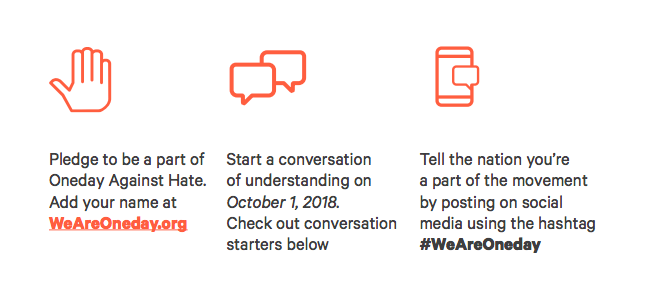Fighting Hate With An Unlikely Weapon: Understanding
September 17, 2018
We live in uncharted times. With hate emboldened and on the rise in our everyday lives, what can we do to turn the tide on hate, bigotry, and bias? We can try to understand each other better.
On October 1, 2018, we’ll come together in our neighborhoods, schools, workplaces, houses of worship, and communities to start conversations of understanding, personal interactions that help us understand each other’s different life experiences and build bridges to deeper, more human connections. Join us in fighting hate through understanding.
What would life be like without hate? Join us on October 1 by starting a conversation to reimagine a world where we respect and understand one another — not hate. #WeAreOneday pic.twitter.com/jC4U3m1QL2
— weare1day (@weare1day) September 6, 2018
Oneday is a positive public response to a rise in bias-driven speech and action that has been documented in America, and around the world. Oneday’s message of seeking and showing understanding as part of our everyday lives is a message we can all learn from.
Oneday was created by a coalition of partner groups looking to fight hate through understanding. The Oneday coalition includes ADL, AEPi, AMEL, BBYO, Erase the Hate, Human Rights Campaign, NAACP, NCEA, PAC-12, PWC, Unidos US, Univision, ZBT, and others.
White supremacist propaganda has increased by 77% in 2017-2018 school year on U.S. college campuses since 2016-2017. Join us to stop the spread of hate, discrimination, & bigotry by starting a conversation of understanding on your campus Oct 1: https://t.co/wpAXNyEng0 pic.twitter.com/0YUEFU35Hi
— weare1day (@weare1day) September 1, 2018
How can you participate in Oneday?
- Pledge: Add your name HERE and pledge to be a part of Oneday Against Hate.
- Converse: Hold a conversation of understanding on October 1, 2018. Check out conversation starters HERE.
- Share: Tell the nation you’re a part of the movement by posting on social media using the hashtag #WeAreOneday

Conversation Starters
- How would you describe the most important aspect(s) of your identity and how has that shaped who you are today? (E.g., race, ethnicity, culture, religion, gender/gender identity, sexual orientation, ability/disability, etc.)
- Describe the first time you remember learning that bias and hate exist in the world.
- What impact has bias or hate had on you in your life?
- Describe a time when someone in your community (growing up or today) stood up to hate or bias.
- How do you think we can make our community or society at large less biased and more equitable?
- When you see something hateful on social media, what is your response? Do you get involved in trying to change their minds or just block those people? Why?
Learn More About OneDay
- Check out the Oneday website here.
- Follow @Weare1Day on Twitter here.
- Follow Oneday on Facebook here.
for Equity & Evidence